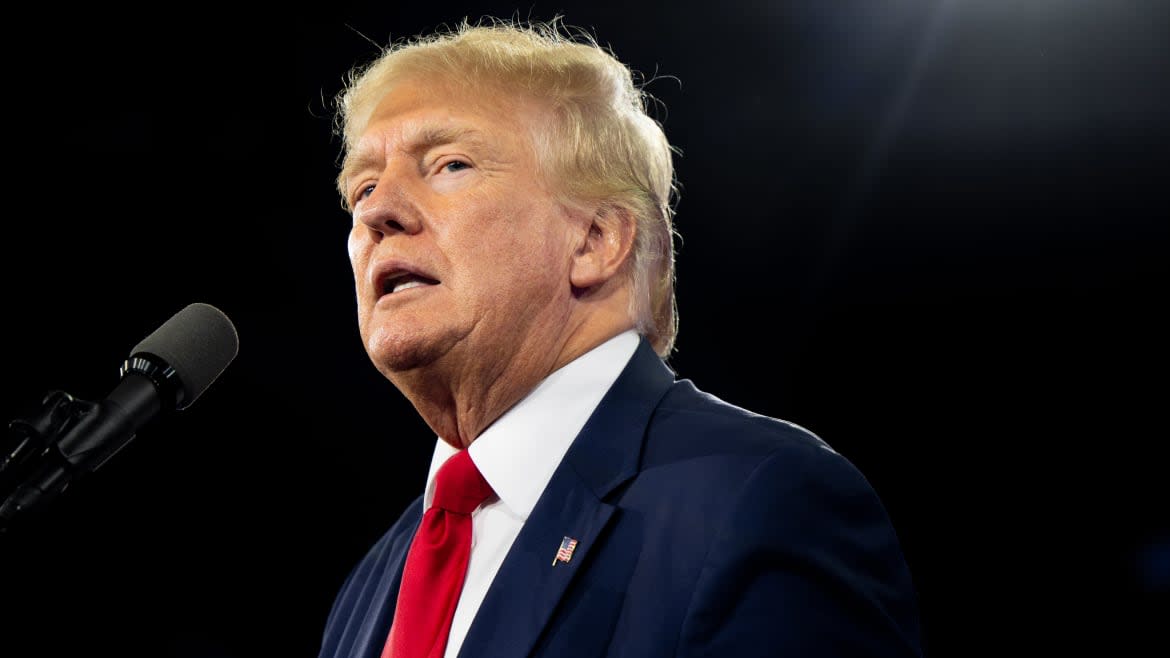How Releasing Trump’s Tax Returns Could Save Our Democracy

- Oops!Something went wrong.Please try again later.
At times the pursuit of former President Donald Trump’s tax returns feels like King Arthur’s search for the Holy Grail—in the belief that it might “heal all wounds, deliver eternal youth and grant everlasting happiness” to our embattled democracy. The thing is, it just might.
The refusal of a federal appeals court to block the release of Trump’s tax returns—despite Trump’s standard histrionics over potential separation-of-powers issues—means the near culmination of litigation that commenced in 2019.
Recall that the House Ways and Means Committee requested Trump’s tax returns from 2015 to 2020 under a federal law that requires information on any taxpayer to be disclosed to the House Ways and Means Committee upon their request. A lawsuit was filed after Trump’s Treasury Secretary Steve Mnuchin defied this law—28 U.S.C. Section 6103 (f)(Disclosure to Committees of Congress) by refusing to comply with the request. Judge Trevor McFadden (a Trump appointee) was assigned to the case and sat on it for nearly two and a half years before ruling in favor of Congress—after Trump had left office.
A panel of the D.C. Circuit Court upheld McFadden’s ruling, and the full D.C. Circuit declined to hear the case as a full panel en banc.
Trump Is Going to Create Yet Another Constitutional Crisis
Yes, Trump can—and will—still go to the Supreme Court. But SCOTUS does not have to take the case, and they should follow the lead of the D.C. Circuit by sitting this one out and letting Congress do its job without interference. Such judicial restraint would be a significant first step in restoring the balance to our supposedly three equal co-branches of government.
In reality, this balance has been deteriorating for quite some time but exponentially so since Trump took over the Republican Party. Trump is, of course, not the first executive to abuse power. The numerous legislative reforms passed in reaction to Richard Nixon’s abuses of power were broad, but they have long faded from memory and, in many cases, have been rolled back and undermined by an increasingly Federalist Society-stacked Supreme Court—particularly in the areas of campaign finance.
The Justice Department Needs to Get Out of Its Own Way in the Trump Investigations
More importantly, those reforms were enacted in reaction to Nixon’s particular misdeeds, but the reform needed now runs far deeper than laws. Much of the concern over the so-called “imperial presidency” has centered around the executive’s ability to wield war-making powers. But even as important as that single issue is, the problem goes beyond whether Congress has abdicated its role in deciding when we go to war.
No single law nor combination of laws can counter Trump and the Republican Party’s efforts to create a strong-man authoritarian government—in which the presidency is a “no-fly zone” where chief executives cannot be scrutinized by Congress nor investigated for potential criminal wrongdoing. A government in which the president controls the judiciary through appointments, and controls Congress through fear of political reprisal—being “primaried.”
The only solution to this dangerous situation is for our three co-equal branches of government to return to their basic missions by having the political courage to both do their jobs and to stay in their lanes.
President Joe Biden’s executive branch needs to root out the corruption ingrained in the Justice Department—after former Attorney General Bill Barr used DOJ as a political weapon for Trump—and encourage bold action by its agencies.
The current Congress, with its slim Democratic majority, needs to use its oversight and investigative powers as the Jan. 6 Committee has already done. Congress also must be unafraid to pass critical reforms—like term limits for Supreme Court justices.
Trump Needed (and Got) a Lot of Help to Be This Corrupt
The current Supreme Court is perhaps the most damaging example of the unbalanced nature of our co-equal branches, wielding as it does nearly complete power over both congressional action and executive decision. This has happened, in part, thanks to Congress’ abdication of power, but also as the Court has taken aggressive exercises of jurisdiction over actions within the executive branch’s purview—ranging from CDC expertise, women’s reproductive rights, religious rights, and campaign finance—to name but a few of the issues that common sense says should not be decided by nine judges appointed for life.
Releasing Trump’s tax returns to Congress won’t solve all the problems in our country right now, but letting Congress do its job by both the executive branch and judicial branch staying out the way offers a glimpse of how things should work.
That’s a sight we’ve been missing for a while.
Get the Daily Beast's biggest scoops and scandals delivered right to your inbox. Sign up now.
Stay informed and gain unlimited access to the Daily Beast's unmatched reporting. Subscribe now.

